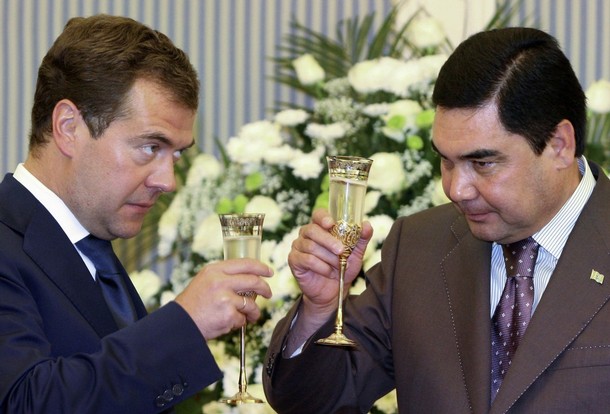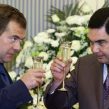
Turkmenistan Still Taking “Time-Out From Gazprom”
Publication: Eurasia Daily Monitor Volume: 6 Issue: 168
By:

Presidents Dmitry Medvedev and Gurbanguly Berdimuhamedov met on September 13 in the city of Turkmenbashi to discuss a possible resumption of Turkmen gas deliveries to Russia. The Russian side stopped taking deliveries through the Central Asia-Center pipeline in early April this year, exploiting its monopsony to force Ashgabat to accept a lower Russian purchase price for Turkmen gas. Russia’s unannounced halt caused excessive pressure and an explosion on the Turkmen side of the pipeline on April 9, interrupting the deliveries to this day.
Turkmen gas supplies -averaging some 45 billion cubic meters (bcm) annually in normal years- are crucial to Russia’s own gas balance and re-export strategy in times of strong international demand. Russia could do without Turkmen gas during the low-demand, recession year 2009. However, the prospect of European (and, related to it, Russian) recovery by next year impels the Kremlin and Gazprom to re-learn the road to Turkmenistan for supply contracts for 2010.
Moscow wants to re-negotiate the high purchase price it had agreed to in 2008 to pay for Turkmen deliveries in 2009. That hike -reportedly to $340 per thousand cubic meters- had in one stroke erased Gazprom’s profits from the re-export of Turkmen gas to Europe. Yet, Gazprom had to accept this arrangement in 2008 in order to sustain Russia’s own export commitments to Europe from stagnant Russian production. Once the crisis struck with full force in early 2009 and demand sank, Moscow simply stopped taking Turkmen gas; and it used the man-made explosion on the pipeline as an added excuse for this. For its part, Turkmenistan remains heavily dependent on Russia for gas exports and needs a stop-gap solution until pipelines in other directions materialize.
In their September 13 meeting, Medvedev and Berdimuhamedov agreed to assign expert teams to negotiate toward a new supply-and-purchase contract and to hold another presidential meeting by the year’s end in Ashgabat. The proposed summit’s timing suggests that they intend to negotiate down to the wire for resuming the deliveries by January 1, 2010. Both presidents indicated that most, though not all, technical issues had been clarified regarding the April accident on the pipeline and that the damage has largely been removed. Although Gazprom blames that accident on pipeline wear-and-tear, the Turkmen side blames it on Russia’s suddenly imposed halt on Turkmen deliveries.
Berdimuhamedov, however, cautioned that "inspection and prophylactic measures are being implemented down to the last detail" on the Turkmen side of the pipeline. Pending such measures, "Turkmenistan is taking a time-out from Gazprom" (Interfax, September 13).
Medvedev’s top foreign policy adviser, Sergei Prikhodko, remarked in previewing the meeting in Turkmenbashi: "It is important for us to understand Turkmenistan’s strategic intentions regarding the gas trade and what Russia’s place is in the Turkmen strategy" (ITAR-TASS, September 13).
Following the meeting, the Russian side almost certainly understood Turkmenistan’s strategy even more clearly -that is, diversification of gas export routes, away from overdependence on Russia. On September 7 Venezuela’s President Chavez met with Berdimuhamedov in Turkmenistan and urged him to join a cartel of gas exporting countries alongside Russia, Iran, Venezuela itself and potentially other countries. Almost certainly, Moscow had arranged this visit and asked Berdimuhamedov to let Chavez state the case. Berdimuhamedov politely ignored this issue during the press event after the meeting (Interfax, Turkmen Television, September 7).
In a public statement on September 11 (occasioned by Oil and Gas Workers’ Day in Turkmenistan), Berdimuhamedov announced that the Turkmenistan-China gas export pipeline would start operating by early 2010 as planned; and that Turkmenistan’s South Yolotan and Osman fields [audited but not yet explored] hold "more than enough gas" to feed the Nabucco pipeline to Europe and other pipeline projects (Interfax, Turkmen Television, Interfax, September 11, 12).
In the oil sector, Russia is now gaining access for the first time to Turkmenistan’s Caspian offshore fields, where several international companies have already been active. Medvedev and Berdimuhamedov witnessed the signing of an exploration and production-sharing agreement by the State Agency for the Management and Use of Natural Resources under the President of Turkmenistan and the Russian Zarubezhneft and Itera companies. The companies will develop a medium-sized offshore oil deposit known as Bloc 21, with 160 million tons of oil and 60 bcm of associated gas, according to preliminary estimates. The estimated investment cost is $1 billion, to be borne entirely by the Russian side (Zarubezhneft 51 percent, Itera 49 percent) -an arrangement suggesting that the Turkmen side takes no risks in this project though it would gain in the event of successful development. The Russian side had negotiated for several years for a total of five Turkmen offshore blocs (Interfax, September 13, 14).




